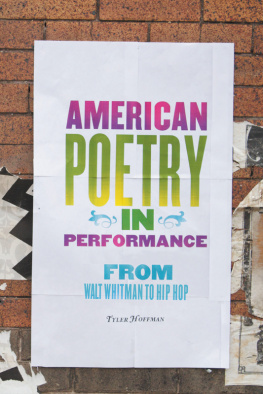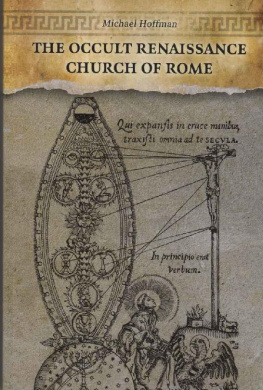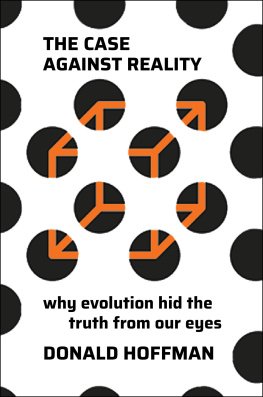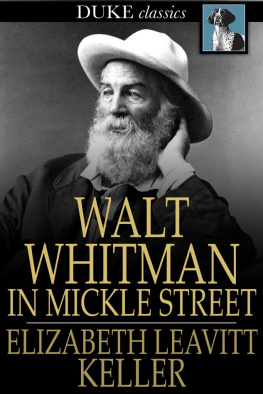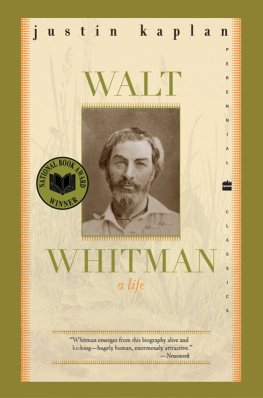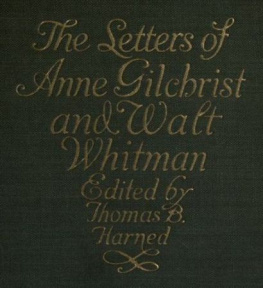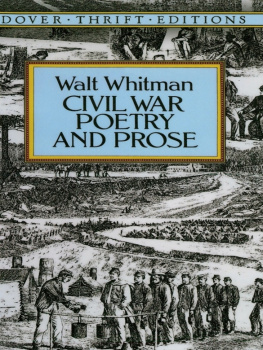Hoffman - American poetry in performance: from Walt Whitman to hip hop
Here you can read online Hoffman - American poetry in performance: from Walt Whitman to hip hop full text of the book (entire story) in english for free. Download pdf and epub, get meaning, cover and reviews about this ebook. City: Ann Arbor, year: 2013, publisher: University of Michigan Press, genre: Art. Description of the work, (preface) as well as reviews are available. Best literature library LitArk.com created for fans of good reading and offers a wide selection of genres:
Romance novel
Science fiction
Adventure
Detective
Science
History
Home and family
Prose
Art
Politics
Computer
Non-fiction
Religion
Business
Children
Humor
Choose a favorite category and find really read worthwhile books. Enjoy immersion in the world of imagination, feel the emotions of the characters or learn something new for yourself, make an fascinating discovery.
American poetry in performance: from Walt Whitman to hip hop: summary, description and annotation
We offer to read an annotation, description, summary or preface (depends on what the author of the book "American poetry in performance: from Walt Whitman to hip hop" wrote himself). If you haven't found the necessary information about the book — write in the comments, we will try to find it.
American poetry in performance: from Walt Whitman to hip hop — read online for free the complete book (whole text) full work
Below is the text of the book, divided by pages. System saving the place of the last page read, allows you to conveniently read the book "American poetry in performance: from Walt Whitman to hip hop" online for free, without having to search again every time where you left off. Put a bookmark, and you can go to the page where you finished reading at any time.
Font size:
Interval:
Bookmark:

First paperback edition 2013
Copyright by the University of Michigan 2011
All rights reserved
This book may not be reproduced, in whole or in part, including illustrations, in any form (beyond the copying permitted by Sections 107 and 108 of the U.S. Copyright Law and except by reviewers for the public press), without written permission from the publisher.
Published in the United States of America by
The University of Michigan Press
Manufactured in the United States of America Printed on acid-free paper
Printed on acid-free paper
2016 2015 2014 2013 5 4 3 2
A CIP catalog record for this book is available from the British Library.
Library of Congress Cataloging-in-Publication Data
Hoffman, Tyler.
American poetry in performance : from Walt Whitman to hip hop / Tyler Hoffman.
p. cm.
Includes bibliographical references and index.
ISBN 978-0-472-11781-9 (cloth : alk. paper)
1. Performance poetryUnited StatesHistory and criticism. 2. Oral interpretation of poetry. 3. American poetryHistory and criticism. 4. American poetryAfrican American authorsHistory and criticism. 5. Poetry slamsUnited StatesHistory. I. Title.
PN4151.H64 2011
811d 2011014824
ISBN 978-0-472-03552-6 (pbk. : alk. paper)
ISBN 978-0-472-02963-1 (e-book)
The presentations of tables, figures, and/or images are dependent on the device and display options. Some image content or language characters may have been removed or may be altered depending on the device used to read this eBook.
for my parents Donald Lee Hoffman and Nancy Jane Hoffman and my children Noah Joseph Hoffman Samuel Robert Hoffman Lili Dare Hoffman
THANKS TO THE FOLLOWING READERS for their judiciousness: Howard Marchitello, Bill Pannapacker, Ken Price, and Michael Robertson. Thanks also to Stephen Cushman, Ed Folsom, and Jay Parini, for whose continuing support I am deeply grateful. I am indebted too to my colleagues in the Dean's Office (you know who you are) for their company and encouragement as the project came to its conclusion, and to Lisa Zeidner, John La-font, and Joe Rively for being there. My book is dedicated to those whom I owe the most.
I also am extremely thankful to Phil Pochoda and Tom Dwyer at the University of Michigan Press for their belief in this project and stewardship of it.
Finally, I wish to acknowledge support from the Rutgers University Research Council and extend my appreciation to the editors of Studies in American Humor, The Wallace Stevens Journal, and the Walt Whitman Quarterly Review in which versions of parts of the following chapters originally appeared.
All the arts are capable of duende, but where it finds its greatest range, naturally, is in music, dance, and spoken poetry, for these arts require a living body to interpret them, being forms that are born, die, and open their contours against an exact present.
FEDERICO GARCA LORCA
To study performance is not to study completed forms[but to] become aware of performance itself as a contested space, where meanings and desires are generated, occluded, and of course multiply interpreted.
ELIN DIAMOND
IN 1882 IN HIS BOOK Specimen Days and Collect, Walt Whitman published a short reiterative prose piece called Ventures, on an Old Theme. In it, he makes his case again for an American poetry free of meter and rhyme, insisting, In these States, beyond all precedent, poetry will have to do with actual facts, with the concrete States, andfor we have not much more than begunwith the definitive getting into shape of the Union. He calls on a new breed of lofty poet to cement the states together, to divert the danger of crass materialism and instill the virtues of nationality and patriotism. Whitman ends by announcing his belief in the reciprocal relationship that must exist between the artist and the public in a democracy, with the epigrammatic assertion, To have great poets, there must be great audiences, too.
That sentence has echoed through the ages, and served as both a foil and a rallying cry for American poets who have sought to understand and articulate the cultural dynamic of popularity. In a 1914 issue of Poetry, the editor, Harriet Monroe, and her foreign correspondent, Ezra Pound, debated the motto taken from Whitman on the cover of the magazine: To have great poets, there must be great audiences, too. Pound opened fire first, protesting, The artist is not dependent upon his audience, and judging
Other poets and poetry commentators have wielded Whitman's message to express their views on the popularization of poetry and its effects. The African American poet Sterling Brown in an essay entitled Our Literary Audience, published in Opportunity in 1930, had this to say: Without great audiences we cannot have great poets. Whitman's trenchant commentary needs stressing today, universally. But particularly do we as a racial group need it. He makes his case for the vital need of the black artist to write realistically about all of black life, including the most common elements of it, and the consequent need for the black audience to be receptive to representations of the race that are truthful even if they are not idealistic, optimistic tracts for race advertisement. Simpson's elitist sense is in line with Pound's and Eliot's, and suggests that the cultivation of a public in fact may be an impediment to producing a lasting literature.
More recently, an article in Time (December 16, 1991) on the emergent poetry slam scene ran Whitman's sentence as its epigraph, teeing up its discussion of the new generation of defiantly populist poets intent on communicating poetry to as large an audience as possible, with the idea being to effect a cultural revolution. In an article in Toronto's National Post (February 28, 2006) Whitman's formulation is once again cited, this time as preface to the announcement of the North American tour of rapper Saul Williams and the industrial rock band Nine Inch Nails and the exploration of Williams's decision to expand his reach by performing for the white kids wearing all black that largely comprise the audience for Trent Reznor, founder of Nine Inch Nails. As these sitings demonstrate, Whitman's epigram increasingly is deployed in discussions about poetry in performance off the page, framing tensions between page and stagethat is, between textuality and oralitythat shape so many of the discussions around poetry performance in the modern period and debates surrounding the merits of publicness.
In The Peril of the Poetry Reading: The Page Versus the Performance published on the website of the American Academy of Poets, David Groff, who concedes that public poetry events bring people together, creating a community for the most intimidating of the verbal arts, expresses reservations about the embodiment of poetry and its public appeal: But even if the poem takes on a fresh life when it's delivered in the voice of its maker, it loses more than it gains. Only when we acknowledge that a poem performed is no substitute for a poem read in private will we truly advance the cause of the poetic word. Many assumptions about poetry and its cultural prestige are packed into that statement, and many of them are contested in this book. Groff goes on to ask the loaded question: In the effort to make poetry popular, is poetry-making itself debased? He answers his own question with lament: There's no chance for the poet or listener's eye to pause, slow down, or linger over a line. How many times have you wanted to ask a poet to decelerate or reread a poem? A recited poem vanishes faster than a vapor trail. The evanescence of performance is seen here as a failing, with no distinction madebetween a poem read well and a poem read poorly (who
Font size:
Interval:
Bookmark:
Similar books «American poetry in performance: from Walt Whitman to hip hop»
Look at similar books to American poetry in performance: from Walt Whitman to hip hop. We have selected literature similar in name and meaning in the hope of providing readers with more options to find new, interesting, not yet read works.
Discussion, reviews of the book American poetry in performance: from Walt Whitman to hip hop and just readers' own opinions. Leave your comments, write what you think about the work, its meaning or the main characters. Specify what exactly you liked and what you didn't like, and why you think so.

